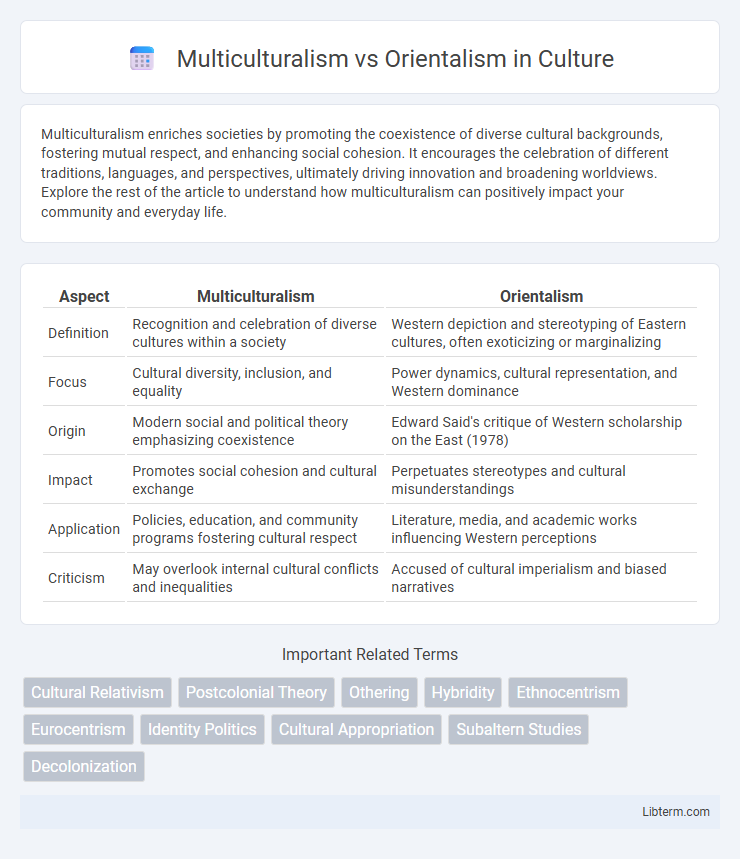Multiculturalism enriches societies by promoting the coexistence of diverse cultural backgrounds, fostering mutual respect, and enhancing social cohesion. It encourages the celebration of different traditions, languages, and perspectives, ultimately driving innovation and broadening worldviews. Explore the rest of the article to understand how multiculturalism can positively impact your community and everyday life.
Table of Comparison
| Aspect | Multiculturalism | Orientalism |
|---|---|---|
| Definition | Recognition and celebration of diverse cultures within a society | Western depiction and stereotyping of Eastern cultures, often exoticizing or marginalizing |
| Focus | Cultural diversity, inclusion, and equality | Power dynamics, cultural representation, and Western dominance |
| Origin | Modern social and political theory emphasizing coexistence | Edward Said's critique of Western scholarship on the East (1978) |
| Impact | Promotes social cohesion and cultural exchange | Perpetuates stereotypes and cultural misunderstandings |
| Application | Policies, education, and community programs fostering cultural respect | Literature, media, and academic works influencing Western perceptions |
| Criticism | May overlook internal cultural conflicts and inequalities | Accused of cultural imperialism and biased narratives |
Understanding Multiculturalism: Definition and Core Principles
Multiculturalism is an inclusive approach that recognizes and values the coexistence of diverse cultural identities within a society, emphasizing cultural pluralism and mutual respect. Core principles include promoting equal rights, social integration, and the preservation of cultural heritage, countering assimilationist pressures. Understanding multiculturalism requires examining its role in fostering intercultural dialogue and combating stereotypes, contrasting with Orientalism's often reductive portrayals of Eastern cultures.
Orientalism Explained: Origins and Key Concepts
Orientalism, a term popularized by Edward Said, refers to the Western depiction and interpretation of Eastern societies, often characterized by stereotypes and cultural biases. Originating in the colonial era, Orientalism frames the East as exotic, backward, and inherently different from the West, reinforcing power dynamics rooted in imperialism. Key concepts include the construction of an "Other," essentialism, and cultural hegemony, which influence academic discourse, media, and political narratives about Asia and the Middle East.
Historical Context: The Rise of Multiculturalism
The rise of multiculturalism emerged in the late 20th century as a response to increasing ethnic diversity and the decolonization process, emphasizing the inclusion and recognition of multiple cultural identities within a society. Originating in Western countries like Canada and Australia during the 1970s and 1980s, multiculturalism aimed to challenge the hegemonic narratives perpetuated by Orientalism, which often portrayed Eastern cultures through exoticized and stereotypical lenses. This shift redefined national identity by promoting cultural pluralism and resisting the monolithic representations rooted in Orientalist discourse.
Orientalism in Art, Literature, and Academia
Orientalism in art, literature, and academia often portrays Eastern cultures through a Western lens, crafting exoticized and stereotyped depictions that reinforce colonial power dynamics. Edward Said's foundational critique highlights how these representations perpetuate cultural hegemony by framing the Orient as fundamentally different and inferior. Despite ongoing debates, Orientalism remains influential in shaping Western narratives, impacting the interpretation and production of cultural knowledge in academic and artistic contexts.
Multiculturalism’s Impact on Social Cohesion
Multiculturalism promotes the inclusion and representation of diverse cultural identities, fostering social cohesion by encouraging mutual respect and understanding among different groups. It challenges Orientalism's simplistic, often stereotypical, portrayals by emphasizing the complexity and equality of all cultures within society. As a framework, multiculturalism helps reduce social tensions and builds a more integrated community through policies supporting cultural diversity and dialogue.
Power Dynamics: Representation and Otherness
Multiculturalism promotes diverse cultural representation by encouraging equitable inclusion of varied identities, challenging traditional power hierarchies. Orientalism reinforces power imbalances by framing Eastern cultures as exotic, inferior, or other, perpetuating stereotypes and cultural domination. These contrasting frameworks highlight how representations shape social power dynamics, either fostering mutual respect or entrenching systemic otherness.
Critiques of Orientalism: Postcolonial Perspectives
Postcolonial critiques of Orientalism emphasize its role in perpetuating stereotypes and power imbalances by portraying Eastern societies as exotic, backward, and inferior to the West. Scholars like Edward Said argue that Orientalism serves as a tool of imperialism, shaping knowledge to justify colonial domination and cultural hegemony. This perspective highlights the necessity of deconstructing Orientalist narratives to foster genuine multicultural understanding and respect for diverse cultural identities.
Multiculturalism vs Orientalism: Key Differences
Multiculturalism celebrates the coexistence of diverse cultures within a society, promoting inclusivity and equal representation, whereas Orientalism is a framework that often stereotypes and exoticizes Eastern cultures through a Western lens. Multiculturalism encourages cultural exchange and mutual respect, contrasting with Orientalism's tendency to impose power dynamics and reinforce cultural hierarchies. These key differences highlight multiculturalism's role in fostering diversity and Orientalism's influence in shaping biased perceptions of the East.
Modern Challenges: Navigating Identity and Diversity
Modern challenges in multiculturalism and Orientalism revolve around navigating complex identity formations and confronting persistent stereotypes. Multiculturalism promotes the coexistence of diverse cultures within a society, encouraging inclusivity and mutual respect, while Orientalism often perpetuates reductive and exoticized representations of Eastern cultures. Addressing these issues requires critical engagement with power dynamics and fostering authentic cross-cultural understanding to overcome prejudice and social fragmentation.
Toward Inclusive Societies: Rethinking Cultural Engagement
Multiculturalism promotes the recognition and celebration of diverse cultural identities within inclusive societies, emphasizing mutual respect and equal representation. Orientalism, often characterized by stereotypical and exoticized portrayals of Eastern cultures, reinforces power imbalances and cultural misrepresentation. Rethinking cultural engagement requires moving beyond Orientalist frameworks to embrace authentic intercultural dialogue that fosters equity and shared understanding.
Multiculturalism Infographic

 libterm.com
libterm.com